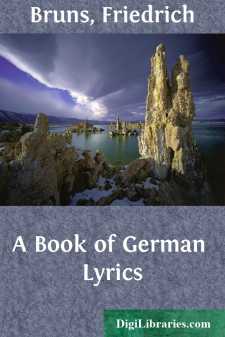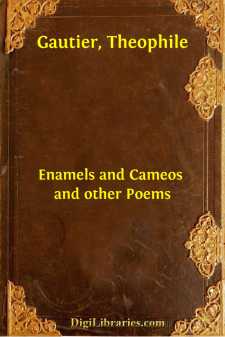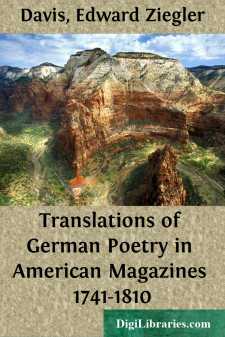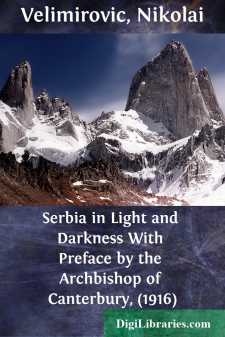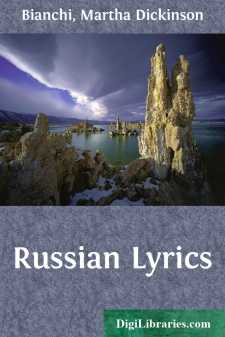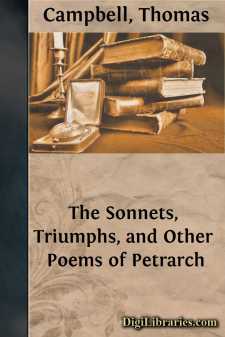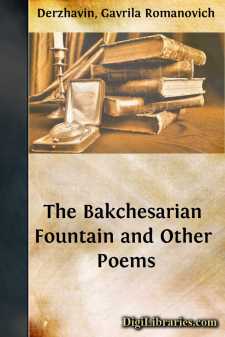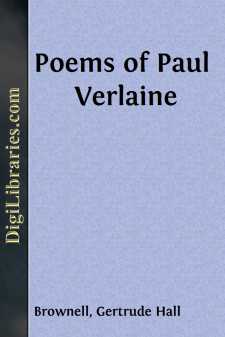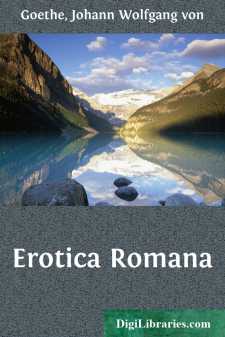Poetry
- American 96
- Ancient, Classical & Medieval 41
- Asian 15
- Australian & Oceanian 11
- Canadian 11
- Caribbean & Latin American 5
- Children's Poetry & Nursery rhymes 51
- Continental European
- English, Irish, Scottish, Welsh 162
- General 483
- Inspirational & Religious 7
- Middle Eastern 3
Continental European Books
Sort by:
by:
Friedrich Bruns
1. WILLKOMMEN UND ABSCHIED Es schlug mein Herz, geschwind zu Pferde!Es war getan, fast eh' gedacht;Der Abend wiegte schon die Erde,Und an den Bergen hing die Nacht;Schon stand im Nebelkleid die Eiche, 5Ein aufgetürmter Riese, da,Wo Finsternis aus dem GesträucheMit hundert schwarzen Augen sah. Der Mond von einem WolkenhügelSah kläglich aus dem Duft hervor; 10Die Winde schwangen leise...
more...
THE GOD AND THE OPALTO THÉOPHILE GAUTIER Gray caught he from the cloud, and green from earth,And from a human breast the fire he drew,And life and death were blended in one dew.A sunbeam golden with the morning's mirth,A wan, salt phantom from the sea, a girthOf silver from the moon, shot colour throughThe soul invisible, until it grewTo fulness, and the Opal Song had birth. And then the god...
more...
INTRODUCTION. The important influence which German literature has exercised on American culture and literature extends from the early part of the nineteenth century. This influence was, in a measure, a continuation of the interest and activity that had existed in England during the last quarter of the eighteenth century. Prior to 1790, numerous translations from Gellert, Wieland, Klopstock, Lessing,...
more...
ENGLAND AND SERBIA. Delivered for the first time in the Chapter House of Canterbury Cathedral. Chairman: the Lord Archbishop of Canterbury. THE SIGN OF THE CHURCH OF ENGLAND. YOUR GRACE, LADIES AND GENTLEMEN, To come to Canterbury, to visit this Sion of the Church of England, that has been my dream since my fourteenth year, when I for the first time was told of what a spiritual work and of what an...
more...
THE SONG OF THE KAZAK Kazak speeds ever toward the North, Kazak has never heart for rest,Not on the field, nor in the wood, Nor when in face of danger pressedHis steed the raging stream must breast! Kazak speeds ever toward the North,With him a mighty power brings,To win the honour of his land Kazak his life unheeding flings—Till fame of him eternal sings! Kazak brought all SiberiaAt...
more...
by:
Thomas Campbell
THE LIFE OF PETRARCH. The family of Petrarch was originally of Florence, where his ancestors held employments of trust and honour. Garzo, his great-grandfather, was a notary universally respected for his integrity and judgment. Though he had never devoted himself exclusively to letters, his literary opinion was consulted by men of learning. He lived to be a hundred and four years old, and died, like...
more...
THE BAKCHESARIAN FOUNTAIN. A TALE OF THE TAURIDE. Mute sat Giray, with downcast eye, As though some spell in sorrow bound him,His slavish courtiers thronging nigh, In sad expectance stood around him.The lips of all had silence sealed, Whilst, bent on him, each look observant, Saw grief's deep trace and passion ferventUpon his gloomy brow revealed. But the proud Khan his dark eye...
more...
CLAIR DE LUNE. Your soul is as a moonlit landscape fair,Peopled with maskers delicate and dim,That play on lutes and dance and have an airOf being sad in their fantastic trim. The while they celebrate in minor strainTriumphant love, effective enterprise,They have an air of knowing all is vain,—And through the quiet moonlight their songs rise, The melancholy moonlight, sweet and lone,That makes to...
more...
INTRODUCTORY NOTE There are few modern poems of any country so perfect in their kind as the "Hermann and Dorothea" of Goethe. In clearness of characterization, in unity of tone, in the adjustment of background and foreground, in the conduct of the narrative, it conforms admirably to the strict canons of art; yet it preserves a freshness and spontaneity in its emotional appeal that are rare in...
more...
I Here's where I've planted my garden and here I shall care for love's blossoms— As I am taught by my muse, carefully sort them in plots: Fertile branches, whose product is golden fruit of my lifetime, Set here in happier years, tended with pleasure today. You, stand here at my side, good Priapus—albeit from thieves I've Nothing to fear. Freely pluck, whosoever would eat....
more...


